After nearly two decades in the fruit and vegetable trade, Martin van den Akker embarked on a new journey as a Variety Manager at the Belgian company EFC two years ago. Besides expanding Kanzi® apples' global distribution, plans are also underway to develop the Sprizzle® apple, launched last year. "The entire apple market benefits from having high-quality, controlled apples on store shelves," he begins.
The first Kanzi apples were harvested in Europe 20 years ago. With over 3,000 hectares worldwide, this apple thrives across five continents and is cultivated in 13 countries. "Last season, we reached a new record, with more Kanzi apples sold worldwide than ever before. Europe is our largest market volume-wise, but Kanzi is expanding globally. We've just relaunched in North America, and in Australia, Kanzi is among the most sold and recognized brands. We're fully committed to making this unique apple flourish in Asia, too."
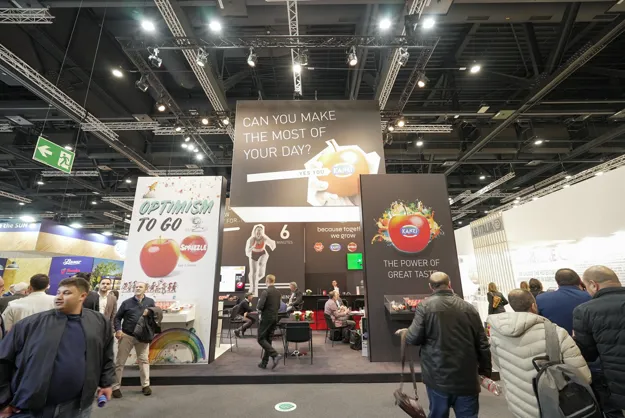
Good choice of apple brands
In recent years, the number of retail apple brands has significantly increased, with more supermarkets introducing their own varieties. "The apple landscape is crowded with several club varieties in the works," Martin admits. He views this development positively. "Apple consumption has been gradually declining for years, so we support giving people a choice. Naturally, we hope they opt for Kanzi, but they must be able to choose."
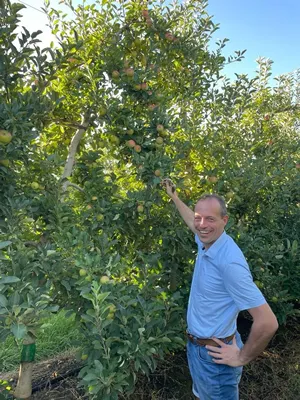 "More good apples on the shelves lead to higher consumption. Consistent quality is crucial. That's why innovation is needed. It boosts this category. If retailers work on clear concepts for each taste profile, it benefits the entire category," says the Variety Manager.
"More good apples on the shelves lead to higher consumption. Consistent quality is crucial. That's why innovation is needed. It boosts this category. If retailers work on clear concepts for each taste profile, it benefits the entire category," says the Variety Manager.
"Every market requires its own approach. Asians traditionally prefer sweet products, while Kanzi has a tangier taste profile. Nevertheless, this huge market offers opportunities. Research shows that some Asians enjoy crunchy, juicy Kanzi apples."
"Even if the market share is lower than in Europe, there's still massive potential. After all, there isn't just one Asian market, but a population larger than Europe and Africa combined," says Martin.
Proven concept
According to him, the biggest challenge is aligning northern and southern hemisphere production and keeping supply and demand balanced. "We must plan ahead; ordering an apple tree today means you get the first tree in two years and the first apples in four. It's a significant puzzle to keep everything in balance worldwide. The advantage of Kanzi is its strong competitive position. Growers or cooperatives know what they're planting because the concept has proven itself in the market, and these apples are already widely available in stores."
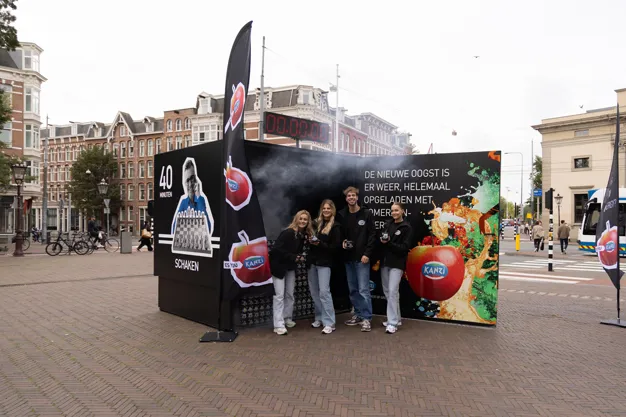
Kanzi apples' susceptibility to canker varies depending on where they are cultivated. "We invest heavily in research, and our protocols and methods work. In some countries, like Italy and South Africa, we have no issues with Neonectria. In other areas, especially those with humid climates, it can be challenging, but thanks to research, we're getting better at controlling disease pressure," Martin explains.
Kanzi apples are also available as organic. "That market is growing at a roughly similar pace as the conventional apple market, but it remains a niche one, with clear spikes in demand in specific areas." Martin adds that inflation had a limited impact on Kanzi purchases. "Still, our growers found it challenging to pass on those increased costs in an already difficult apple season. In certain markets, like Germany, our marketing campaign focused more on conversion than branding to actively encourage people to buy Kanzi apples on the spot," he explains.
Sprizzle
Last October, EFC launched the new Sprizzle apple brand in the German market. "We're in the development phase, but the response to this new concept has been overwhelmingly enthusiastic. It's been available at German retailers since January. Sprizzle is truly distinctive and somewhat tricky to define in terms of taste. It's sparkling sweet, leaving an almost champagne-like tingle on the tongue. That's why our marketing uses a descriptive approach, highlighting the distinctive character through tastings and packaging."
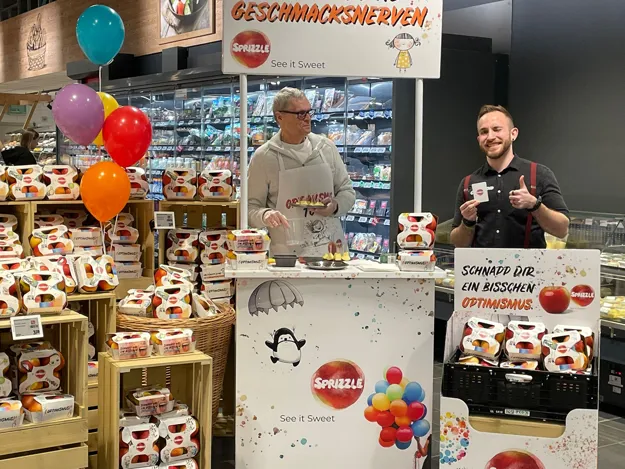
Could Sprizzle eventually surpass Kanzi's market share? "In the long term, certainly," replies Van den Akker. "But remember, we've been building the Kanzi concept for two decades. Pink Lady was emerging back then, and we benefited from the first-mover advantage. By now, the number of concept varieties has multiplied. It will undoubtedly take another 20 years before Sprizzle gains such a share. But we definitely think we have a distinctive concept, and market research in several countries is promising."
Climate adaptation
Climate adaptation significantly affects new variety development, too. "Both in our existing varieties' further development and the introduction of new ones. We must move towards varieties our global partners can still cultivate well in 2040 or 2050. After all, developing a new variety takes decades," Martin states.
EFC has been Kanzi's variety manager and exclusive global rights holder since 2004, for Greenstar since 2004, for Migo pears since 2014, and for Sprizzle since 2018. What type of apple does EFC still want to develop? "A new affordable one, for the general public that can be grown sustainably and climate robustly. It must set a new standard in stores with a constant optimal quality compared to Gala. If we have a good replacement for that to meet every consumer need with a specific apple, then we have something genuinely special."
According to Martin, we should not expect an expansion into other fruit types. "We adhere to the principle 'shoemaker, stick to your task'. We're not just building brands; we're trying to create added value throughout the entire chain, from breeder to consumer. We also provide agronomic advice for our varieties. We prefer to do what we do well rather than embarking on a new adventure," he concludes.
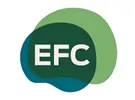 For more information:
For more information:
Martin van den Akker
EFC Fruit
59E Kernielerweg
3840, Borgloon, Belgium
Tel.: +32 (0) 12 33 99 00
[email protected]
www.efcfruit.com










